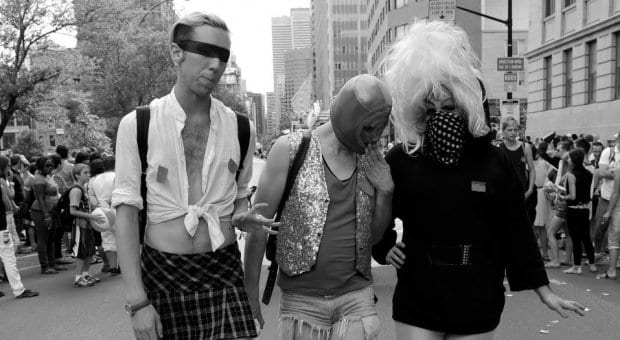Montreal summers can seem like one long continuous festival. But the organizers of Pervers/Cité still felt something was missing — so they launched their annual event seven years ago.
Divers/Cité (one of the city’s two Pride festivals, along with Fierté) had announced it was cancelling its Pride parade and community day. “They decided to scale back and focus on large outdoor stages because the people who were coming were not their target audience,” says Pervers/Cité collective member Josh Pavan. “This led to a lot of questions around what we want to see at Pride. It’s great to have outdoor shows and I still go to a lot of their events, but it reduces the most visible way to participate in the queer community to the role of spectator, and that’s what we’re trying to challenge.
“I grew up on a farm in southern Alberta, so I understand the importance and impact of broad-swath queer visibility,” he adds. “But we shouldn’t sidestep the question of what that visibility should be for and engage in a discussion around what vision of queer community we’re putting forward.”
Programmed through an open call for submissions, the 10-day event features panel discussions, workshops, picnics and film nights alongside good old-fashioned dance parties. The collective tries its best to make room for everything; most of the selection process is about helping event organizers find spaces and avoiding schedule conflicts, rather than excluding specific proposals.
“The main thing we ask for from all our event organizers is to make things accessible for people who can’t afford an entry fee,” Pavan says. “Most events are free, and those that aren’t, people can usually get in by volunteering.”
Much of the organization’s focus is on connecting Pride back to its radical roots.
“When we say radical, we mean understanding the gay movement as a social movement and trying to build links across other social movements,” Pavan says. “It might be the feminist movement, the prison justice movement, the migrant justice movement or the HIV movement. Right now the queer movement is succeeding in terms of victories for marriage equality and corporate funding, when all other social movements are facing losses, so we think it’s important to examine how to respond to that.”
While more and more large corporations sprinkle gay events with dollars every year, hoping for a lucrative return on investment by promoting their brand, Pervers/Cité takes a strong anti-corporatization stance. Funded largely by throwing house parties throughout the year, the event’s budget typically comes in at just more than $2,000 (a paltry sum compared to the millions most cities spend on Pride).
“Where the money comes from really sets the kind of dialogues that can take place at an event,” Pavan says. “If you’re bringing in a bunch of international acts, corporatization is inevitable, because the money has to come from somewhere. But if you rethink Pride as something that doesn’t have to cost a lot, it brings you back to the basis of what it is.”
Pervers/Cité
Thurs, Aug 8-Sun, Aug 18
Various venues around Montreal
perverscite.org


 Why you can trust Xtra
Why you can trust Xtra


